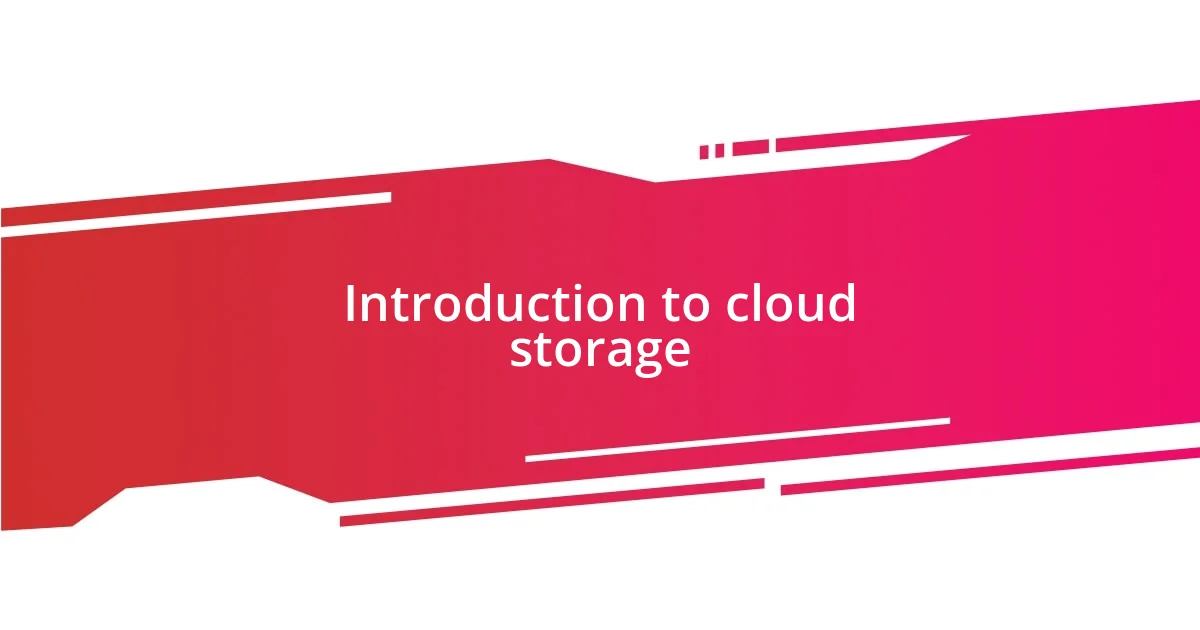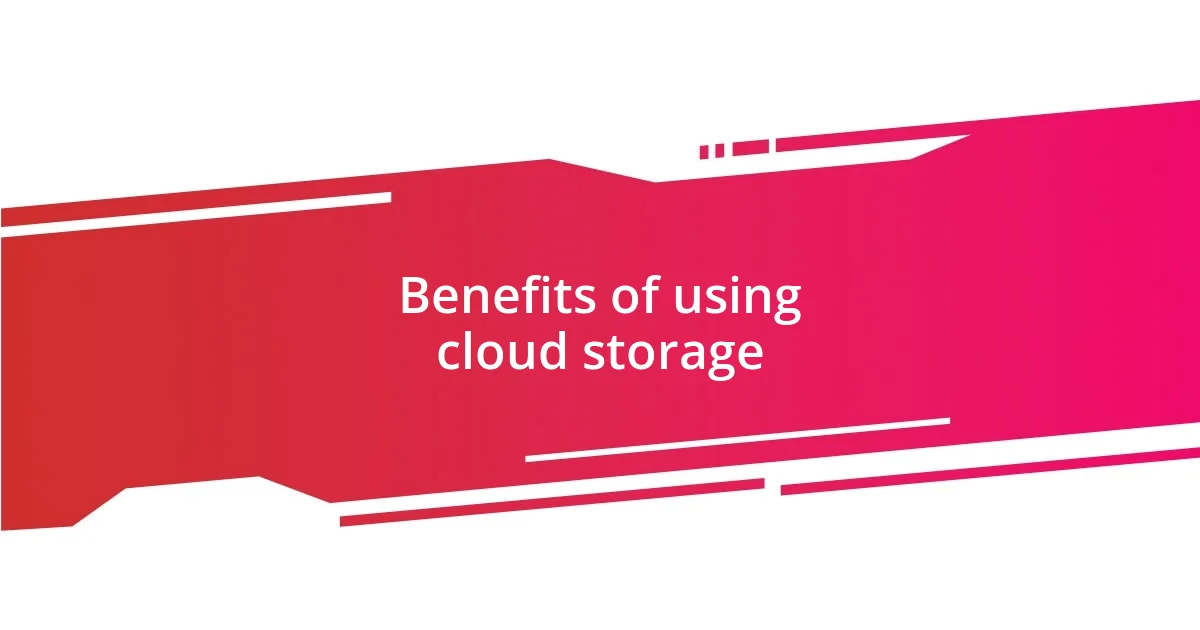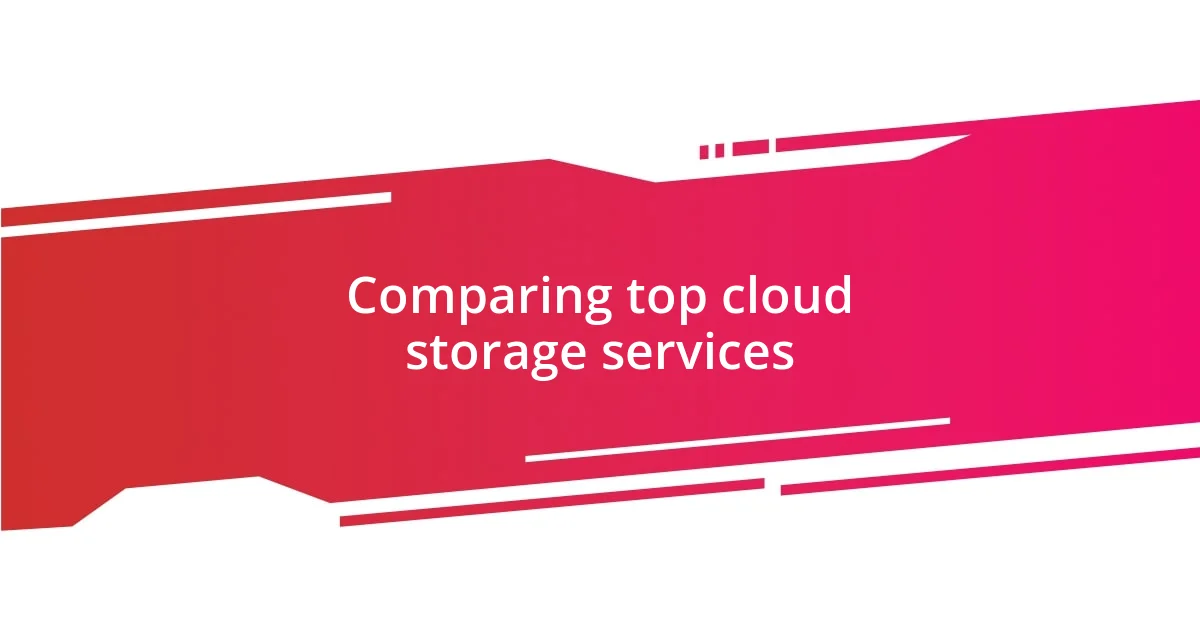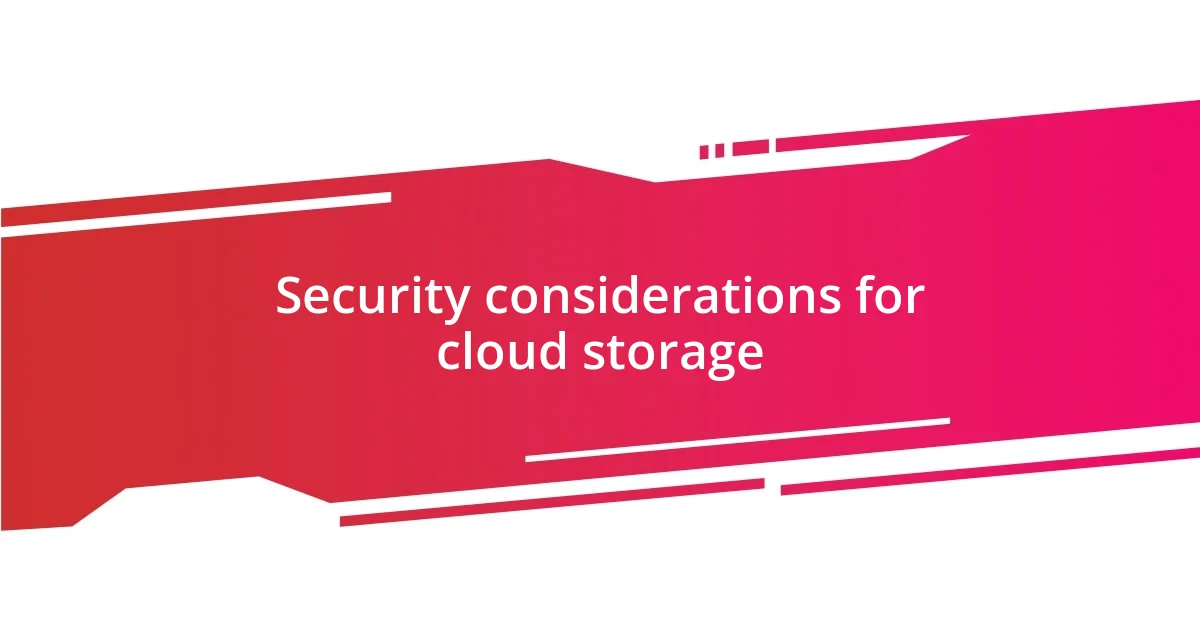Key takeaways:
- Cloud storage offers significant convenience and security, enabling users to access files from anywhere while ensuring data safety.
- Key features to consider when selecting a service include strong security measures, sync capabilities, and suitable pricing models to match user needs.
- Regular security audits and clear data privacy policies are essential for protecting sensitive information and maintaining user trust in cloud storage solutions.

Introduction to cloud storage
Cloud storage feels like a lifeline in today’s fast-paced digital world. The idea that I can store my important files online—accessible from anywhere—brings a sense of security that’s hard to match. Have you ever sat at a coffee shop, needing a document, and realized it was a click away instead of buried in a USB drive at home? That convenience is a game changer.
At its core, cloud storage allows users to save data on remote servers rather than on local hard drives. This means I can keep my photos, documents, and projects safe without worrying about hardware failures or losing a flash drive. The flexibility it offers is a breath of fresh air, especially when I think about how many times I’ve had to scramble for backups.
When I first transitioned to using cloud storage, I was skeptical—would my data truly be secure? But over time, I’ve come to appreciate the layers of security offered by these solutions. The idea of accessing my files from my phone or tablet is liberating. How do you feel about relying on the cloud? For me, it’s about more than just storage; it’s about peace of mind and readiness in our digital age.

Benefits of using cloud storage
Using cloud storage completely transforms how I manage my files and data. The accessibility it provides is truly remarkable. For example, last month, I was attending a meeting and realized I needed to pull up a presentation I had worked on. Instead of panicking, I quickly accessed it from the cloud on my phone. That immediate access saved me from what could have been an embarrassing moment.
Here are some key benefits of cloud storage:
- Accessibility from Anywhere: Access your files from any device with an internet connection.
- Automatic Backups: Many cloud services offer automatic backups, so your data is always safe.
- Scalability: You can easily adjust your storage needs as your data grows.
- Cost-Effective: Reduces costs related to hardware and maintenance.
- Enhanced Collaboration: Share files effortlessly with colleagues for better teamwork.
The emotional relief that comes with knowing my data is backed up and accessible is priceless. Each time I think about my previous struggles with physical storage, I’m grateful for the simplicity and reliability that cloud solutions provide. It’s like having a personal assistant that ensures everything I need is just a click away.

Key features to consider
When considering cloud storage solutions, one of the most significant features that come to mind is security. I can still vividly recall when I had my laptop stolen during a trip. The thought of my personal data exposed was terrifying. That experience reinforced how crucial it is for a cloud storage provider to offer strong encryption protocols. Look for services that provide end-to-end encryption, ensuring that your data remains confidential at all times.
Another key aspect is sync capabilities. I remember once having to edit a document last minute before a presentation. Luckily, my cloud storage solution allowed real-time syncing across devices. This means that I can start a project on my laptop and seamlessly continue it on my tablet or smartphone without losing any updates. Having that flow is not just convenient; it eliminates the stress of managing multiple versions of documents.
Finally, pricing models also play a vital role in choosing the right service for your needs. While I once opted for a free storage option, I soon realized that the limitations—such as reduced storage space and features—stifled my productivity. Investing in a paid plan can often bring added advantages like increased storage, better support, and enhanced features. It’s worth evaluating what each service offers and finding a price point that aligns with your needs.
| Feature | Importance |
|---|---|
| Security | Essential for protecting sensitive data |
| Sync Capabilities | Ensures seamless access across devices |
| Pricing Models | Determines value based on features and storage |

Comparing top cloud storage services
When I set out to compare cloud storage services, it struck me just how varied they can be. For instance, I once had a frustrating experience with a service that promised seamless collaboration, only to find myself struggling with frequent sync issues. Has that ever happened to you? The annoyance of losing track of changes or hosting a meeting while worrying about the latest edits can be overwhelming. Understanding the strengths and weaknesses of each service can make a world of difference in productivity.
As I dived deeper, it became clear that user interface played a pivotal role in my experience with cloud storage. I remember switching to a platform that felt more intuitive, sparking a newfound joy in organizing my files. Honestly, who wants to waste time fumbling through a tangled web of menus? A clean, easy-to-navigate dashboard can elevate your entire workflow. It’s like choosing a comfortable pair of shoes—when it fits well, you hardly notice it’s there.
Finally, the scalability of these services can’t be ignored. I once underestimated my storage needs, only to experience a last-minute scramble when I hit my limit. Scarcity often leads to stress, doesn’t it? Now, I prefer solutions that grow with me. I find peace of mind in knowing that as my data expands, my cloud storage can keep up without a hitch. When choosing a service, consider not just your current needs but where you might be heading in the future.

Security considerations for cloud storage
When it comes to cloud storage, security is paramount. I remember when I first started using a cloud service for my photography portfolio. The idea of putting my cherished images online was nerve-wracking. That’s when I learned about the importance of two-factor authentication (2FA). It offers an extra layer of security, making it substantially harder for unauthorized users to access my files. I can’t stress enough how comforting it is to know that my work is protected by more than just a password.
Another crucial aspect to consider is data privacy policies. Not long ago, I stumbled upon a cloud provider that boasted strong encryption but had vague terms regarding data usage rights. It left me uneasy—would they sell my data to third parties? I’ve always been cautious about where I store my files, as understanding how your data is used gives you control over your privacy. I’d encourage anyone to read the fine print; it’s better to be safe than sorry when it comes to something as personal as our information.
Finally, I can’t overlook the importance of regular security audits. I recall a conversation with a friend who had their files compromised, simply because their provider hadn’t updated their security protocols in ages. Imagine the panic! Cloud storage should be as dependable as any other piece of technology we rely on. So, before choosing a service, investigate how often they perform security checks and updates. Knowing that my provider takes these precautions enhances my confidence in using their service.















